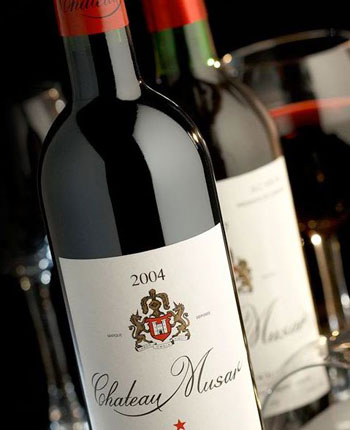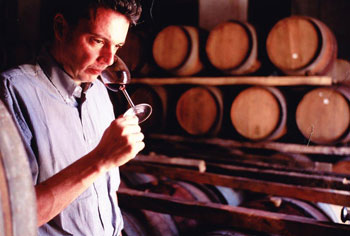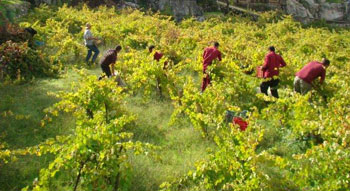Château Musar: Natural Wines from Lebanon
The 2011 vintage of Chateau Musar was appreciated by a famous American magazine from the West Coast; it was rated as one of the Top 100 wines for the year 2011. Chateau Musar has a particular natural wine production philosophy. In fact they even say that they don’t produce wine; they let the wine produce itself.
Interview with Gaston Hochar of Chateau Musar

Now that two years have passed since our last interview, what is new with outlook for tourism in Lebanon? What are your projections for the years to come? What are the general trends that you are seeing?
There was a trend during the last 5 years when Lebanese tourism was increasing and it was so until 2010. From 2011 onwards, there was some political and social unrest that started to develop in the region, i.e. in the Middle East, and a certain political unrest in Lebanon as well, which meant that tourism started to drop. Now with the big events happening in the region, I think tourism is probably slowing down a little bit unfortunately, unlike the trend we saw over the past 5 years, and where we thought it would continue increasing. But this is something that we do not master because the region is not a simple one, it´s a fairly complex situation so different things may happen.
And now for the trends, are you still positive or negative with the outlook for tourism?
The outlook for tourism should be slightly negative for the coming year because of the unrest in the area, in the Middle East, but once this unrest clears up and we know where the future is heading to, I think Lebanese tourism should pick up again quite drastically.
Looking at the Chateau Musar winery itself, what have been the latest developments over the past 2 years? What have been some of the rewards and recognitions that Chateau Musar has been able to achieve and how do you see the outlook for your winery?
In 2010 the weather was difficult; we had a very big heat wave which meant that we lost 35-40% of the crop; 2011 was a more normal year in terms of climatic conditions so a more normal harvest, the quality was good so production is on the right track. Concerning sales development, we have had an increase and we are pushing for the countries of South East Asia, pushing for the Americas as well, so Canada, South America and more importantly the United States. Concerning Europe, the trend is steadier and more stable because of the economic situation there. In terms of the company´s development we are focusing more and more on the Chateau Musar philosophy, producing more and more wines with the same attitude of natural wine making and I think this is where we, as Chateau Musar, need to stay focused on as it gives us a typicity and unicity which makes us stand apart in the world of wine.
You clearly see a strategy in diversification from the others to be unique within the wine market not only concerning Lebanon…
There is definitely a strategy to be different and to position ourselves and our natural wines as a unique product. If you taste our wines and you taste other wines not only from Lebanon but from around the world, Musar’s wines have a definite peculiar taste which means if you appreciate those kinds of wines you will stick to them. It gives us a certain typicity which makes us different from all the other producers, so this is what we intend to focus on.
So this is a good time to talk about some of the products you would like to market, some of the wines or varieties, in what they are special, what sort of awards they received.
We are focusing more on our high end product which is the Chateau Musar. In fact, the 2011 vintage was not rewarded – because this is not a term I like – but was appreciated by a famous American magazine from the West Coast, it was rated as one of the Top 100 wines for the year 2011 and the winery was also put as one of the Top 100 wineries in the December issue from last year.
The 2011 vintage was appreciated by a famous American magazine from the West Coas. It was rated as one of the Top 100 wines for the year 2011.
How is this wine special? What did they say?
Why did they pick it? I don’t know, they picked it because at the time it was our current wine, but the 2011 vintage definitely has some characteristics that make it stand a little bit apart and in fact Chateau Musar has this ability to produce natural wines which are the most natural possible, this means that each vintage has a definite character of it’s own, different from the previous vintages, which means that they represent the “terroir”, the climate, everything which is truly special to that vintage. And so each year can give you a different taste and a different understanding of the flavors, of the wine, of all the nature.
As you mentioned before, the wine industry in Lebanon has been a huge success and of course this success attracted new entrants, which is for sure good for the country as it increases competition. Lebanese wines are spreading around the world. How is this development affecting Chateau Musar?
It is true that if we talk historically about wines, in Lebanon we used to have 3 to 5 producers over the past 40 years and up until the mid 90´s; from the mid 90´s onwards, there was a certain number of companies who started producing wines. In 2005-2006, we were nearly 15 to 20 wineries, and in the last 3 to 5 years there has been several newcomers, so today we are approximately 30 to 35 producers in Lebanon which makes a lot of newcomers to the world of wine, a lot of new products on the market, a lot of competition and a lot of different products for the customer to choose from.
This is one of the reasons why Musar is specifically developing more and more its peculiar and its own characteristic to be able to differentiate ourselves from the competition. So this is one of the reasons also why we tend to focus more and more on what we used to do and the philosophy we have of making wines which have the ability to age, hide a certain philosophy and are very characteristic of the company.
Are the local wine producers in Lebanon struggling to compete globally?
In fact, it´s getting more difficult for all the wine producers around the world, competitiveness is increasing and there have been a lot of wineries in the last years that have probably closed their doors, and so with Chateau Musar we are still steady, increasing slightly in some countries and so this allows us to continue on our own path and with our marketing strategy to, like I said earlier, continue making things as different as possible so people will recognise the unicity and if they want something different to just a normal wine, they will pick Musar.
You are producing “natural” wines of course and this implies a certain risk, so how do you make thisyour natural wines work?
Over the years that have passed by, we have developed a certain ability to produce wines in a natural way; there is a certain way of production which is our motto, or our company´s secret; not secret because secret is not a good word, but our company´s know-how and this natural philosophy makes our wines taste different.
Take an example: you go and buy a bottle of wine – any wine, Lebanese or other – you take a bottle of Chateau Musar, you compare, you taste them both and you`ll see that Chateau Musar has a different taste. Why? Because it is produced in a natural way, because it comes from a certain climate, a certain terroir, because it’s not a wine that´s been killed by technology. So there are billions of reasons why Chateau Musar’s wine is different.
When you look globally do you see the competition in this specific segment of natural wines increasing? Do you see the natural wines as a trend in the industry?
There is a trend in the industry for two things: one for bio-dynamic wines and one for organic wines. Bio-dynamic is something that is very specific and organic is something also quite different. Our vineyards are certified organic so I can say we tend to follow the natural path, and we have had this certificate issued for the last 5 years, but I tend to prefer the term natural wines to organic wines.
Organic wine is more a term or a word that has been used more for marketing purposes and Chateau Musar having a certain unicity and typicity, it has a certain level of quality in the world of wine and we do not want to have our product put in a space that is just organic.
We want to be Chateau Musar. In fact in the wine and grape production, we go far beyond the requirements of the organic status so this is why we tend to say that we produce natural wines and not just organic wines.
This must be challenging to really keep a distinction between the organic and natural and I can see that this could be a point of frustration sometimes…
It´s not a frustration; it is more to be able to defend Musar’s typicity and character and to make people understand exactly the philosophy behind the production by saying and explaining that we produce our natural wines with a particular natural wine production philosophy. In fact we even say that we don’t produce wine; we let the wine produce itself because wine existed before humans intervened. If you take grape juice and leave it on its own, it will ferment in a natural way, so you don’t need to come and put limits or put boundaries to have wine. It’s something that’s done by nature, so in fact we let nature do what it should and this is the most important part.
You think your mission has been accomplished, therefore, do people now clearly see Musar as standing out from the competition by having this brand of natural wines or are people still a bit confused?
You know when we tend to present our wines we present them in a certain way, we cannot pass this same message to 7 billion people on earth, so you always have new people who haven’t tasted Chateau Musar before who are now coming and who have the opportunity to taste Chateau Musar wine at one point in their lifetime. Sometimes they taste it knowing what is Musar and sometimes they taste by accident or because somebody asked them to taste it because it was different or unique or for the experience, and so they do not always have the explanations that are connected to the natural wines of Chateau Musar.
If they are interested and they want to know the Musar brand better, they can participate at tastings that we organize all around the world, or browse our website on the internet, or contact us if they want more specific information about one specific product, so there are many ways today to get the information and we tend to try and give the information to whoever wants to have it.
Let’s talk a bit about challenges because we haven’t done that. You are a traditional, family run business and you are not one of the largest you don’t have all the cash in the world to market your products and to produce as much as you want. So these could be some of the challenges but I wanted to ask you your view on what some of the frustrations, challenges, and problems you are facing?
The problems are all the problems that a Lebanese company can face; the challenge is to continue to produce wine in a world which is ever developing, to continue to produce quality wine. We’re a small company, increasing the quantity would pose problems because it would be difficult to continue and master the quality with the quantity that would be continually increasing, so we have decided that our top quality wine will continue to be produced in a very little quantity, we will not increase the production, it would not be wise.
If we were to increase the winery’s production it would be in the younger wines, the more affordable and more modern style which can be more easily produced and sold, not in the top quality which has the ability to age because it’s a much more difficult thing to control. We are a family business, we intend to continue and to stay a family business because in my opinion there is a saying in English which says “Small is beautiful”, so when you continue to be at a certain size which is not huge, you can continue controlling the different elements, when you increase the size of a company you see growth but the growth comes with a lack of control and I think in the wine business being a family company is a plus and in that respect it has to remain at a certain scale to avoid losing the control and if you lose the control you lose the identity, you lose the identity you lose the philosophy and so it goes as a snowball.
We’re trying to bring our wines to the maximum number of people so that those who have the experience or who have a certain palate whose taste is developed will have the opportunity to taste Chateau Musar. This is the only aim.